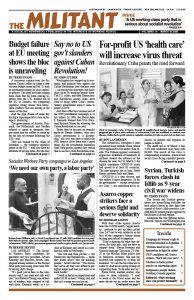The Syrian and Turkish governments are intensifying airstrikes on each other’s forces as they fight over control of Syria’s Idlib province, a region held by armed groups opposed to the Bashar al-Assad regime.
Alongside the two fighting forces, Moscow, Tehran and Washington also deploy their military in Syria to advance their own interests, all with deadly consequences for working people. Close to 1 million people have fled the regime’s merciless pounding and are pinned near the Turkish border, while the government in Ankara won’t allow them to cross.
Some 33 Turkish soldiers were killed Feb. 27 when Assad’s forces unleashed airstrikes in an ongoing offensive. The Turkish government recently doubled to 10,000 the number of troops it has in northwest Syria as well as amassing 30,000 more along the border.
The Turkish rulers fund, arm and command the National Liberation Front, one of several opposition groups operating in Idlib. The best armed of Assad’s opponents is the reactionary jihadi outfit Hayat Tahrir al-Sham, which runs the civilian administration of the province and has about 15,000 fighters. Some 40% of the 3 million residents now in Idlib fled there to escape earlier assaults by Assad and his allies.
Turkish President Recep Tayyip Erdogan had signed a deal with his Russian counterpart, Vladimir Putin, that allowed Syrian rebels to settle in Idlib under Ankara’s protection. Assad tossed that aside to launch his offensive, backed by Putin’s air power, and troops from Hezbollah and other Tehran-backed militias.
Ankara retaliated against the killing of Turkish soldiers. Airstrikes on Assad’s troops killed 26 on Feb. 29, including 10 from Hezbollah and four from other Tehran-organized militias, as well as an officer from the Iranian rulers’ Revolutionary Guard. The next day Turkish warplanes shot down two Syrian aircraft and launched airstrikes on a military airport in Aleppo. The Ankara-controlled media claims the Turkish forces have “neutralized” hundreds of Syrian troops.
The Iranian rulers and their allied militias have helped prop up the Syrian regime, while creating bases there and routes for shipping missiles to Hezbollah in Lebanon within range of Israel. Opposition to Tehran’s military actions and interference in Syria, Iraq and elsewhere in the Middle East was a target of protests by workers and youth across Iran last November.
Erdogan and Putin have met several times since Ankara used its military to intervene in the fighting in Idlib, but continue to sharply disagree. So far they haven’t targeted each other’s forces. In addition to their air power, the Russian rulers also have special forces, military advisers and mercenary groups aiding Assad.
Washington deploys 500 troops in the Kurdish-held area of northeastern Syria and wields vast firepower across the Middle East. It seeks to use the current conflict to draw the Turkish government away from Moscow and back into its orbit.
Ankara’s deal for a Russian-made S-400 missile defense system angered the U.S. rulers, who suspended selling F-35 fighter jets to the Turkish government. Ankara has requested Washington send them the rival U.S.-made Patriot system, but it’s on hold.
Republican Sen. Lindsey Graham pressed Washington to intervene, using its clout to establish a no-fly zone over Idlib together with U.S. allies, and to push “back against Iran, Russia and Assad.”
U.S., all foreign troops out of Syria!
“Working people here can offer solidarity to fellow workers in Syria by demanding the U.S. and the other intervening forces get out of the country,” Socialist Workers Party vice presidential candidate Malcolm Jarrett told the Militant. “Working people in Syria need space and time to organize to fight for their own interests, free of foreign military intervention.”
A powerful uprising for political rights and for the overthrow of the Assad regime, involving millions of working people, unfolded in 2011, but was brutally repressed. In the civil war that ensued, Assad lost control of much of the country. Moscow’s intervention with its air power in 2015 changed the relationship of forces, and the regime began to retake territory.
To pressure governments in Europe to support Turkish military intervention in Syria, Erdogan opened the borders with Europe to allow refugees from Syria, Afghanistan and elsewhere to head there. The government in Greece responded by massing troops and cops on the border and attacked thousands of immigrants attempting to cross into the country March 2.

